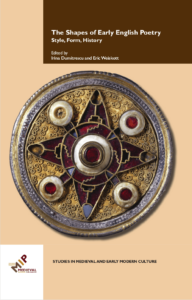edited collections
- with Irina Dumitrescu, The Shapes of Early English Poetry: Style, Form, History. Kalamazoo, MI: Medieval Institute, 2019. In honor of Roberta Frank.
This volume contributes to the study of early English poetics. In these essays, several related approaches and fields of study radiate outward from poetics, including stylistics, literary history, word studies, gender studies, metrics, and textual criticism. By combining and redirecting these traditional scholarly methods, as well as exploring newer ones such as object-oriented ontology and sound studies, these essays demonstrate how poetry responds to its intellectual, literary, and material contexts.
from the back cover
The contributors propose to connect the small (syllables, words, and phrases) to the large (histories, emotions, faiths, secrets). In doing so, they attempt to work magic on the texts they consider: turning an ordinary word into something strange and new, or demonstrating texture, difference, and horizontality where previous eyes had perceived only smoothness, sameness, and verticality.
- with Stephanie L. Batkie, “Chaucer’s Langland.” Yearbook of Langland Studies 32 (2018): 237–389. An essay cluster.
The essays in this cluster are drawn from a roundtable discussion of the same name we organized at the New Chaucer Society’s 20th Biennial Congress in London in July 2016. In convening the roundtable, we meant to revisit a vexed question: did Chaucer read Langland? More broadly, we wanted to bring Langland to NCS, to open space for greater commerce between scholarship on Chaucer and scholarship on Langland. While the division of research activities between the NCS and the International Piers Plowman Society, and their corresponding scholarly journals, is understandable and productive, it seemed to us that the two bodies of critical commentary could benefit from an opportunity for renewed comparison and cross-reference.
from the introduction
- with Natalie Gerber, “Prosody: Alternative Histories.” Arcade: Literature, Humanities, and the World (launched December 2018). A Stanford Colloquy.
Prosody thus traverses a set of vexing historical oppositions—between structuralist and poststructuralist, or formalist and historicist, or empirical and theoretical, methodologies; between departments in the twenty-first-century university—especially the languages, linguistics, cognitive sciences, and comparative literature; not to mention between poets and critics, the producers and analysts of prosody. Hoping to move past these artificial divides, this Colloquy brings together work in multiple media across disciplines, all considering reciprocal relationships between prosody and history, variously defined. The goal of the discussion is to inspire the kinds of productive disagreements that can move prosody closer to Donald Wesling’s vision of a unified field. This Colloquy shows that verse rhythm and aesthetic pleasure always exist in a dialectic relationship with many histories.
from the headnote
scholarly edition
- with the assistance of Celia Smithmier, “The Death of Blanche the Duchess.” In The Works of Geoffrey Chaucer, ed. Julia Boffey and A. S. G. Edwards (Cambridge University Press, under contract)
articles and notes
- with Gina Case, “A Re-edition and Reading of a Middle English Alliterative Prophecy,” Studies in Philology (forthcoming)
- with Joon Park, “Middle English araten and Scenes of Condescension in Piers Plowman.” The Explicator 80 (2022): 73–7
- with Ian Cornelius, “The Intricacies of Counting to Four in Old English Poetry.” Language and Literature 30 (2021): 249-75 [academia.edu]
- with Stephanie L. Batkie, “Introduction.” Yearbook of Langland Studies 32 (2018): 237–44. For the “Chaucer’s Langland” essay cluster. [academia.edu]
book chapter
- with Irina Dumitrescu, “Introduction.” In The Shapes of Early English Poetry: Style, Form, History, ed. Dumitrescu and Eric Weiskott (Kalamazoo, MI: Medieval Institute, 2019), pp. 1–12
conference presentations
- [see conference tab]
grants
- with Tina Montenegro, Medieval Academy CARA Grant for regional medieval studies conference, 2024
- with Tina Montenegro, Institute for the Liberal Arts Major Grant for regional medieval studies conference, 2024
- Institute for the Liberal Arts Innovations in Graduate Education grant, group for first-generation and/or low-income graduate candidates, 2019–22
- MediaKron Special Project Grant faculty cohort, Boston College, 2015–16
- assistant for digital humanities to Alastair Minnis and Barbara A. Shailor, Andrew W. Mellon Foundation Scholarly Communications and Information Technology grant, “Digitally Enabled Scholarship with Medieval Manuscripts,” Yale University, 2012–14

